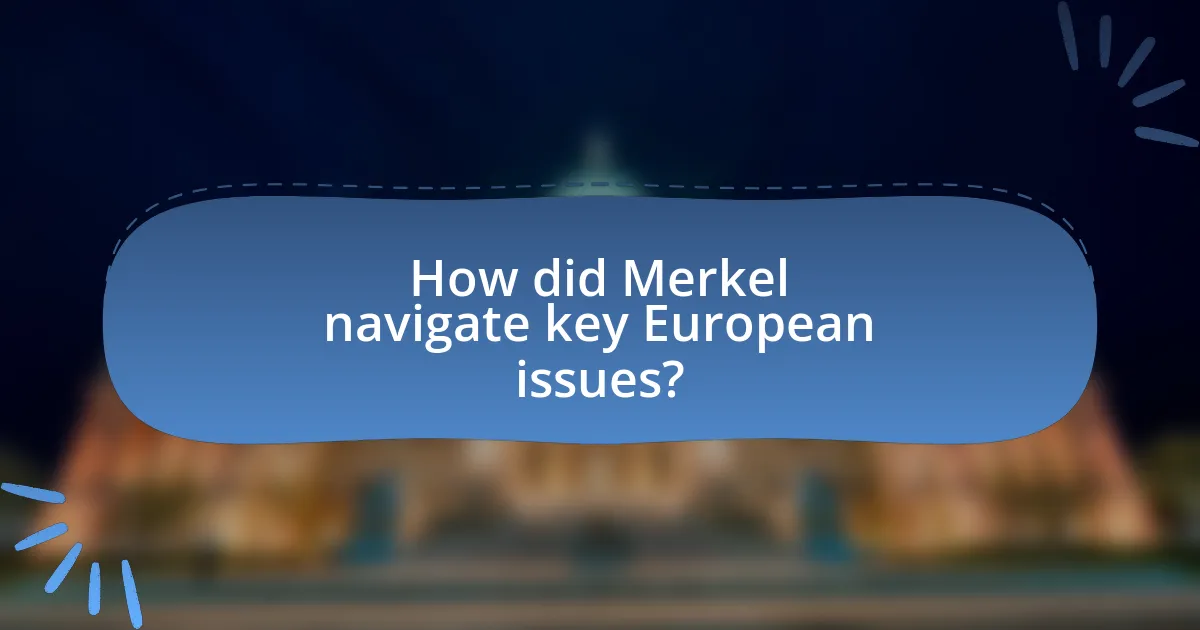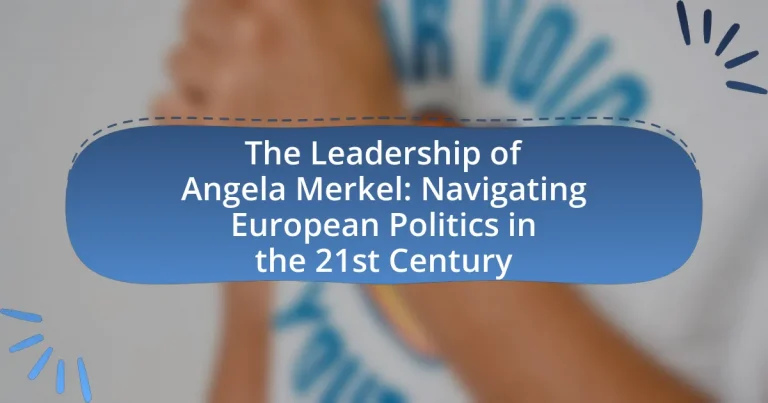Angela Merkel, who served as Chancellor of Germany from 2005 to 2021, is a pivotal figure in European politics, known for her pragmatic leadership style and commitment to European integration. This article examines her rise to power, key milestones in her political career, and the core principles that defined her leadership, including consensus-building and resilience. It also explores her handling of significant challenges such as the Eurozone debt crisis and the refugee crisis, her influence on EU policies, and her approach to international relations with major world powers. Merkel’s legacy and the lessons from her leadership style provide insights into effective governance in contemporary political landscapes.

What defines the leadership of Angela Merkel in European politics?
Angela Merkel’s leadership in European politics is defined by her pragmatic approach, consensus-building skills, and strong advocacy for European integration. Merkel, serving as Chancellor of Germany from 2005 to 2021, played a pivotal role in navigating crises such as the Eurozone debt crisis and the migrant crisis, emphasizing stability and solidarity among EU member states. Her leadership style was characterized by a cautious yet decisive decision-making process, often seeking broad agreement before implementing policies. For instance, during the Eurozone crisis, Merkel’s insistence on fiscal discipline and structural reforms was crucial in shaping the EU’s response, demonstrating her influence in maintaining the euro’s stability. Additionally, her commitment to multilateralism and collaboration within the EU framework reinforced her position as a key leader in European politics.
How did Angela Merkel rise to power in Germany?
Angela Merkel rose to power in Germany by becoming the leader of the Christian Democratic Union (CDU) in 2000 and subsequently winning the federal elections in 2005. Her ascent was marked by her ability to navigate the political landscape effectively, leveraging her background in science and her experience as Minister for Women and Youth and later as Minister for the Environment. Merkel’s pragmatic approach and consensus-building skills helped her gain support across party lines, leading to her election as Germany’s first female Chancellor. Her leadership was characterized by significant events such as the management of the Eurozone crisis and the refugee crisis, which solidified her position as a key figure in European politics.
What were the key milestones in Merkel’s political career?
Angela Merkel’s political career is marked by several key milestones, including her election as the first female Chancellor of Germany in 2005, her leadership during the European financial crisis, and her role in managing the refugee crisis in 2015. Merkel’s tenure began with her election victory, where she formed a coalition government, establishing her as a significant figure in German and European politics. During the European financial crisis, she played a crucial role in shaping EU policies, advocating for fiscal discipline and support for struggling economies. In 2015, her decision to accept over a million refugees highlighted her humanitarian approach, significantly impacting Germany’s demographic and political landscape. These milestones collectively underscore her influence and leadership in navigating complex political challenges in Europe.
How did Merkel’s background influence her leadership style?
Angela Merkel’s background as a scientist and her upbringing in East Germany significantly influenced her leadership style, characterized by pragmatism and consensus-building. Merkel’s education in physics and her experience in a totalitarian regime fostered a methodical approach to problem-solving and a deep understanding of the importance of stability and gradual change. Her formative years in East Germany instilled a cautiousness and a preference for dialogue over confrontation, which became evident in her collaborative leadership style during crises such as the Eurozone debt crisis and the refugee crisis. This background enabled her to navigate complex political landscapes effectively, emphasizing compromise and long-term solutions over populist rhetoric.
What are the core principles of Merkel’s leadership?
The core principles of Merkel’s leadership include pragmatism, consensus-building, and a strong commitment to European integration. Merkel’s pragmatic approach is evident in her ability to adapt policies based on changing circumstances, such as her response to the Eurozone crisis, where she balanced fiscal discipline with support for struggling economies. Consensus-building is a hallmark of her leadership style, as she often sought to forge agreements among diverse political factions, exemplified by her coalition governments. Additionally, her commitment to European integration is reflected in her advocacy for a united Europe, particularly during the refugee crisis, where she emphasized humanitarian responsibility while navigating complex political landscapes.
How did Merkel approach consensus-building in the EU?
Angela Merkel approached consensus-building in the EU through pragmatic negotiation and fostering collaboration among member states. Her leadership style emphasized dialogue and compromise, often seeking to bridge divides between countries with differing interests, as seen during the Eurozone crisis when she advocated for fiscal discipline while also supporting economic aid to struggling nations. Merkel’s ability to build coalitions was evident in her role in the negotiation of the EU’s multiannual financial framework, where she successfully aligned the priorities of both net contributors and recipients, demonstrating her commitment to a unified Europe.
What role did pragmatism play in her decision-making?
Pragmatism played a crucial role in Angela Merkel’s decision-making by enabling her to prioritize practical solutions over ideological commitments. This approach allowed her to navigate complex political landscapes effectively, as evidenced by her handling of the Eurozone crisis, where she balanced fiscal discipline with the need for economic stability in member states. Merkel’s pragmatic decisions, such as her support for the European Stability Mechanism, demonstrated her focus on achievable outcomes rather than rigid adherence to theoretical principles, ultimately reinforcing her leadership in European politics.
What challenges did Merkel face during her tenure?
Angela Merkel faced several significant challenges during her tenure as Chancellor of Germany from 2005 to 2021. Key challenges included managing the European debt crisis, which began in 2009 and required Merkel to navigate complex negotiations to stabilize the Eurozone, particularly in countries like Greece, Spain, and Italy. Additionally, she dealt with the refugee crisis in 2015, when Germany accepted over one million asylum seekers, leading to political backlash and debates over immigration policy. Merkel also confronted rising populism and far-right movements within Germany and across Europe, which threatened the stability of her coalition government. Furthermore, she had to address climate change and energy policy, particularly after the Fukushima disaster in 2011, which prompted a shift away from nuclear energy. These challenges required her to balance domestic concerns with broader European and global issues, shaping her leadership style and legacy.
How did the Eurozone crisis impact Merkel’s leadership?
The Eurozone crisis significantly strengthened Angela Merkel’s leadership by positioning her as a key decision-maker in European economic policy. During the crisis, Merkel advocated for strict fiscal discipline and austerity measures, which shaped the response to the financial turmoil affecting several Eurozone countries. Her insistence on these policies garnered both support and criticism, ultimately solidifying her image as a pragmatic leader committed to the stability of the Euro. Merkel’s leadership during this period was characterized by her ability to navigate complex negotiations, such as the bailout agreements for Greece, which required balancing national interests with broader European solidarity. This approach not only reinforced her authority within Germany but also elevated her status on the international stage, as she became a central figure in discussions about the future of the Eurozone.
What was Merkel’s response to the refugee crisis in Europe?
Angela Merkel’s response to the refugee crisis in Europe was characterized by her decision to open Germany’s borders to a significant number of asylum seekers, particularly in 2015. Merkel stated, “We can do this,” emphasizing Germany’s capacity to accommodate refugees fleeing conflict and persecution, particularly from Syria. This policy led to Germany accepting over one million refugees that year, which was a pivotal moment in European migration policy and sparked both support and criticism across the continent. Merkel’s approach aimed to uphold humanitarian values while also addressing the demographic challenges facing Germany.

How did Merkel navigate key European issues?
Angela Merkel navigated key European issues through a pragmatic and consensus-driven approach, emphasizing stability and collaboration among EU member states. She played a crucial role during the Eurozone crisis by advocating for fiscal discipline while also supporting bailout packages for struggling economies like Greece, which helped maintain the integrity of the euro. Merkel’s leadership during the refugee crisis in 2015 showcased her commitment to humanitarian values, as she opened Germany’s borders to a significant number of asylum seekers, influencing EU migration policies. Additionally, her strong stance on climate change led to Germany’s leadership in the Paris Agreement negotiations, reinforcing the EU’s commitment to environmental sustainability. These actions collectively illustrate Merkel’s ability to balance national interests with broader European unity, solidifying her influence in European politics.
What was Merkel’s stance on European integration?
Angela Merkel strongly supported European integration throughout her tenure as Chancellor of Germany. She believed that a united Europe was essential for maintaining peace, stability, and economic prosperity on the continent. Merkel’s commitment was evident in her advocacy for measures such as the Eurozone bailout packages during the financial crisis and her support for the European Union’s expansion and deeper integration, including initiatives like the European Stability Mechanism. Her leadership emphasized the importance of collective action among EU member states to address challenges such as the refugee crisis and economic disparities, reinforcing her stance that European integration was vital for the future of Europe.
How did Merkel influence EU policies on economic stability?
Angela Merkel significantly influenced EU policies on economic stability through her leadership during the Eurozone crisis and her advocacy for fiscal discipline. Merkel’s insistence on austerity measures and structural reforms in economically weaker EU member states, particularly Greece, aimed to restore financial stability and prevent a potential collapse of the Euro. Her role in shaping the European Stability Mechanism (ESM) and supporting the implementation of the Fiscal Compact in 2012 further solidified her commitment to maintaining economic stability within the EU. These policies were designed to ensure that member states adhered to strict budgetary rules, thereby fostering a more resilient economic framework across the Eurozone.
What initiatives did Merkel support for strengthening the EU?
Angela Merkel supported several initiatives aimed at strengthening the European Union, including the Eurozone crisis management measures, the European Stability Mechanism (ESM), and the migration policy reform. Merkel advocated for the ESM to provide financial stability and support to member states facing economic difficulties, which was crucial during the Eurozone crisis. Additionally, she promoted a comprehensive migration policy that emphasized solidarity among EU countries, particularly during the 2015 refugee crisis, aiming to create a more unified approach to migration and asylum. These initiatives reflect her commitment to enhancing EU integration and resilience in the face of challenges.
How did Merkel handle relations with major world powers?
Angela Merkel managed relations with major world powers through a pragmatic and diplomatic approach, emphasizing multilateralism and consensus-building. She maintained strong ties with the United States, particularly during Barack Obama’s presidency, advocating for shared values and cooperation on global issues such as climate change and security. Merkel also navigated complex relations with Russia, balancing economic interests with a firm stance on issues like the annexation of Crimea, which led to sanctions against Russia. Additionally, her leadership in the European Union positioned Germany as a key player in addressing challenges posed by China, promoting a balanced approach that encouraged trade while addressing human rights concerns. Merkel’s tenure was marked by her ability to foster dialogue and collaboration among diverse global leaders, reinforcing Germany’s role as a stabilizing force in international relations.
What strategies did Merkel employ in dealing with the United States?
Angela Merkel employed a strategy of pragmatic diplomacy and multilateralism in dealing with the United States. She emphasized building personal relationships with U.S. leaders, notably maintaining a strong rapport with President Barack Obama, which facilitated cooperation on issues like climate change and economic policy. Merkel also advocated for a united European stance on transatlantic relations, particularly during times of tension, such as the Trump administration’s approach to NATO and trade. Her commitment to multilateral institutions, such as the G7 and G20, reinforced her strategy of collaboration over confrontation, aiming to align U.S. policies with European interests while addressing global challenges collectively.
How did Merkel approach relations with Russia and China?
Angela Merkel approached relations with Russia and China through a pragmatic and cautious strategy, balancing economic interests with political values. Merkel emphasized dialogue and engagement with Russia, advocating for cooperation while also addressing issues such as human rights and security concerns, particularly in response to Russia’s annexation of Crimea in 2014, which led to her supporting sanctions against Russia. In her dealings with China, Merkel focused on fostering economic ties, promoting trade and investment, while also raising concerns about human rights and the need for a level playing field for European companies. This dual approach aimed to maintain Germany’s economic interests while upholding its commitment to democratic values and international norms.
What legacy did Merkel leave in European politics?
Angela Merkel’s legacy in European politics is characterized by her role as a stabilizing force and a key architect of the European Union’s response to multiple crises. Merkel’s leadership during the Eurozone crisis, particularly her insistence on fiscal discipline and structural reforms in countries like Greece, shaped the EU’s economic policies and reinforced Germany’s influence within the bloc. Additionally, her open-door policy during the 2015 refugee crisis demonstrated her commitment to humanitarian values, although it also sparked significant political debate and backlash across Europe. Merkel’s pragmatic approach to governance and her ability to build consensus among diverse member states have left a lasting impact on the EU’s political landscape, fostering a more integrated yet complex union.
How is Merkel viewed by her peers in the EU?
Angela Merkel is viewed by her peers in the EU as a pragmatic and influential leader. Her tenure as Chancellor of Germany from 2005 to 2021 established her as a key figure in European politics, particularly during crises such as the Eurozone crisis and the migrant crisis. Merkel’s ability to navigate complex negotiations and her commitment to European unity earned her respect among fellow leaders, who often regarded her as a stabilizing force within the EU. Her leadership style, characterized by consensus-building and a cautious approach, contributed to her reputation as a reliable partner in addressing transnational issues.
What impact did Merkel’s leadership have on future European leaders?
Merkel’s leadership significantly influenced future European leaders by establishing a model of pragmatic, consensus-driven governance. Her approach emphasized stability, economic responsibility, and a commitment to European unity, which set a benchmark for leadership styles across the continent. For instance, Merkel’s handling of the Eurozone crisis and her open-door policy during the refugee crisis demonstrated a blend of compassion and realism, encouraging subsequent leaders to adopt similar strategies in crisis management. Additionally, her tenure highlighted the importance of scientific expertise in policymaking, as seen in her response to the COVID-19 pandemic, which future leaders are likely to emulate.
What lessons can be learned from Merkel’s leadership style?
Merkel’s leadership style teaches the importance of pragmatism, consensus-building, and resilience in governance. Her pragmatic approach allowed her to navigate complex political landscapes, such as the Eurozone crisis, by prioritizing stability and economic growth over ideological rigidity. Consensus-building was evident in her ability to work with diverse political parties and stakeholders, fostering collaboration within the European Union. Additionally, her resilience in facing challenges, such as the refugee crisis and climate change, demonstrated the value of steadfastness and adaptability in leadership. These lessons highlight the effectiveness of a balanced, inclusive, and flexible leadership style in addressing contemporary political issues.
How can emerging leaders apply Merkel’s principles?
Emerging leaders can apply Merkel’s principles by emphasizing pragmatism, consensus-building, and resilience in their leadership approach. Merkel’s pragmatic decision-making style, demonstrated during the Eurozone crisis, highlights the importance of addressing issues with a focus on practical solutions rather than ideological positions. Additionally, her ability to build consensus among diverse stakeholders, as seen in her handling of the refugee crisis, underscores the value of collaboration and inclusivity in leadership. Finally, her resilience in facing criticism and maintaining a steady course during turbulent times serves as a model for emerging leaders to remain steadfast and adaptable in the face of challenges.
What strategies for consensus-building can be derived from her approach?
Angela Merkel’s approach to consensus-building emphasizes collaboration, active listening, and incremental negotiation. She consistently fostered dialogue among diverse stakeholders, ensuring that all voices were heard, which facilitated mutual understanding and trust. Merkel’s method of prioritizing common ground over divisive issues is evidenced by her role in the European Union’s response to the Eurozone crisis, where she advocated for compromise solutions that balanced fiscal discipline with economic support for struggling nations. This strategy not only stabilized the Eurozone but also reinforced her reputation as a pragmatic leader capable of uniting differing perspectives for collective action.
How can leaders balance pragmatism and idealism in governance?
Leaders can balance pragmatism and idealism in governance by integrating realistic policy-making with visionary goals. For instance, Angela Merkel exemplified this balance during her tenure by addressing immediate economic challenges while advocating for long-term European integration and climate policies. Merkel’s approach included pragmatic decisions, such as managing the Eurozone crisis through fiscal measures, alongside her idealistic vision of a united Europe, demonstrated by her support for the Paris Agreement on climate change. This dual strategy allows leaders to respond effectively to current issues while maintaining a commitment to broader, aspirational objectives.
What are the best practices for navigating political crises?
The best practices for navigating political crises include clear communication, building coalitions, and maintaining public trust. Clear communication ensures that leaders convey accurate information and address public concerns, as demonstrated by Angela Merkel’s transparent approach during the Eurozone crisis, which helped stabilize markets and public sentiment. Building coalitions allows for a united front, as seen in Merkel’s collaboration with other European leaders to address the refugee crisis, fostering a sense of shared responsibility. Maintaining public trust is crucial; Merkel’s consistent engagement with citizens through town hall meetings and media appearances reinforced her credibility during challenging times. These practices are essential for effective crisis management in political leadership.
How did Merkel’s crisis management techniques contribute to her success?
Angela Merkel’s crisis management techniques significantly contributed to her success by emphasizing pragmatism, consensus-building, and effective communication. During the Eurozone crisis, Merkel’s approach involved balancing fiscal discipline with solidarity, which helped stabilize the European economy and maintain Germany’s leadership role. Her ability to navigate complex negotiations, such as those during the migrant crisis in 2015, showcased her skill in fostering dialogue among EU member states, ultimately leading to a coordinated response. Furthermore, Merkel’s calm demeanor and fact-based decision-making instilled public confidence, reinforcing her position as a reliable leader during turbulent times. These techniques not only solidified her political standing but also enhanced Germany’s influence within the EU.
What role does communication play in effective leadership during crises?
Communication is essential for effective leadership during crises as it fosters transparency, builds trust, and facilitates informed decision-making. Leaders who communicate clearly and consistently can convey critical information, reduce uncertainty, and guide their teams through challenging situations. For instance, during the European debt crisis, Angela Merkel’s clear communication regarding Germany’s stance and actions helped stabilize markets and maintain confidence among EU member states. This approach exemplifies how effective communication can mitigate panic and promote collaboration, ultimately leading to more effective crisis management.


